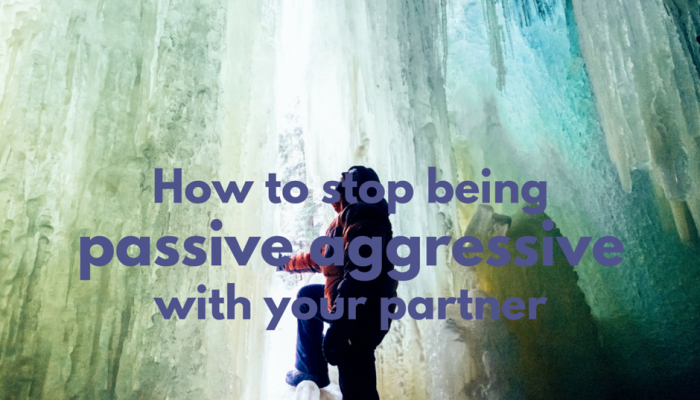A couple that’s been coming to see me for couples counseling for a few weeks has an on-going problem. Like many couples with marital issues, Jenn and Kyle have communication issues. Their particular issue is that they don’t know how to express their anger with one another without being passive aggressive. They’re unable to effectively tell each other what’s wrong with them without holding in their frustration until it boils over in dysfunctional ways.
What does being “passive aggressive” look like?
Most of us have been passive aggressive in relationships. We’re not proud of doing it. And when we realize we’ve been acting passive aggressively, we might recognize that it’s simply not an effective way of communicating what we really want to say.
Here are some common ways that people in a relationship communicate passive aggressively:
Jenn is upset with Kyle coming home from work later and later. She waits to tell him that she’s upset until a fight ensues. Jenn reminds Kyle that 2 months ago he lied to her about being out with his friends until 3am. The next day they talked about it and Kyle apologized recognizing his mistake. The problem with Jenn bringing this up again is that it has no bearing on what they are currently dealing with.
-
Expressing anger about the wrong issue
Kyle is angry that Jenn hasn’t been spending much time with him. He waits to express his anger with her until she doesn’t answer his phone calls one afternoon. Although Jenn had a perfectly good reason that she couldn’t answer her phone, Kyle blows up on her pointing out the missed calls. Instead of telling his wife he has missed spending time with her, he picks a fight over the missed calls.
-
Withholding from your partner
Jenn is still pissed at Kyle for having to cancel their dinner one night due to a work conflict. She doesn’t tell him how much it bothered her that they couldn’t go out for a dinner that she was excited about. Instead of telling him she is upset, she has been withholding sex from him since that night they missed their dinner plans. She tries to express her feelings of being hurt by withholding her affection.
-
Getting back at your partner
Another way Kyle displays his passive aggressive nature is by imitating the behavior that he upset about. When he doesn’t think that Jenn is answering her phone when he calls because “she is ignoring him”, he does the same to her. For the next couple days, Kyle ignores phone calls from his wife as if to say “see what it feels like?”
 The damage caused
The damage caused
Here’s what passive aggressive behavior in a relationship leads to:
-
Walling off from our partner
-
The feeling of walking on egg shells
-
Hiding the truth from our partner and feeling we “can’t win”
-
Less intimacy
-
More anger
-
More hurt
 What keeps us from communicating what we’d really like to say?
What keeps us from communicating what we’d really like to say?
So why are we passive aggressive with our partners? Like most of our behaviors, acting out passive aggressively is a learned behavior.
Where does it come from?
-
Families that keep secrets
-
Learning from passive aggressive parents
-
Feelings of unworthiness
-
Feelings of shame and guilt
-
Feeling righteous or being grandiose
How to say what we really want to say
This part takes a mutual understanding between both partners. It requires using healthy boundaries and respect.
Nobody wants to be told to “be honest” only to have their honesty thrown back in their face!
-
Agree that there is a problem with one or both of you have a problem being passive aggressive.
-
Ditch the shame in admitting that you (and or your partner) can be passive aggressive.
-
Listen to one another! Don’t overlook what you’re partner is saying only to focus on what to say next.
-
Recognize that you have a right in your relationship to voice what you are thinking and feeling as long as you are respectful in doing so.
-
Refrain from using sarcasm. Don’t let your sarcastic humor spill into serious matters in your relationship.
Learn more about why your partner can’t read your mind
Read more about what dysfunctional communication pitfalls
Like with any relational skill, learning how to be more upfront with your communication takes practice. So too does learning how to help a partner be less passive aggressive. Both partners have a responsibility. So say what you have to say. Listen to your partner. Ditch the sarcastic tendencies as it can be a communication killer. With a little effort and understanding you might discover closer and more intimate communication and closeness in your relationship.



Great post, John!